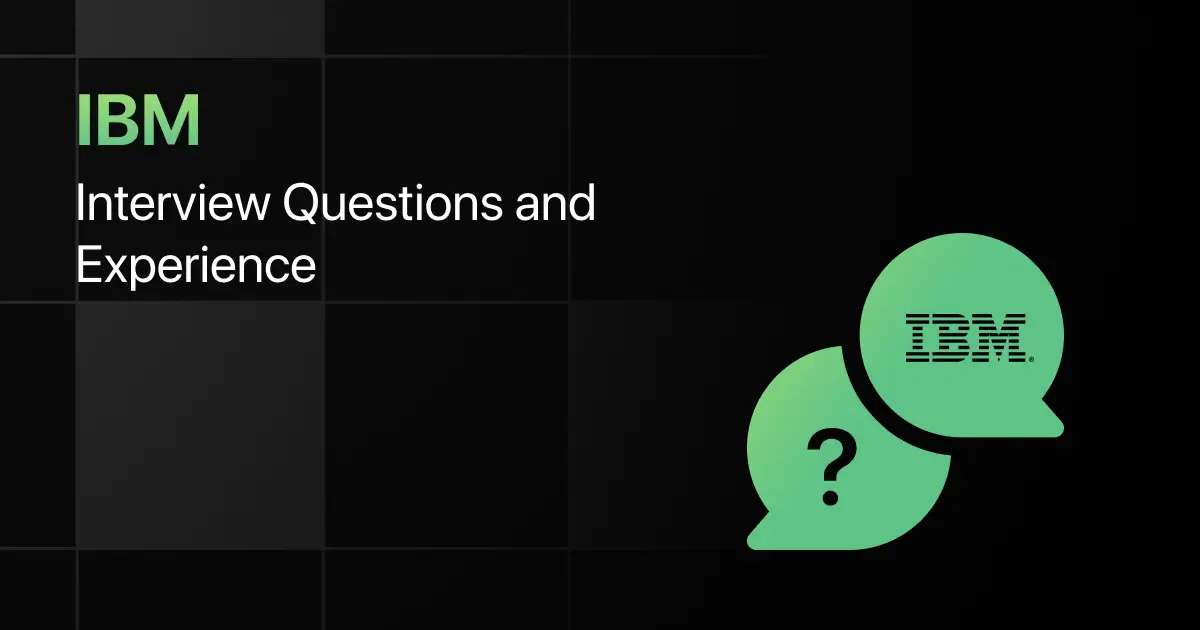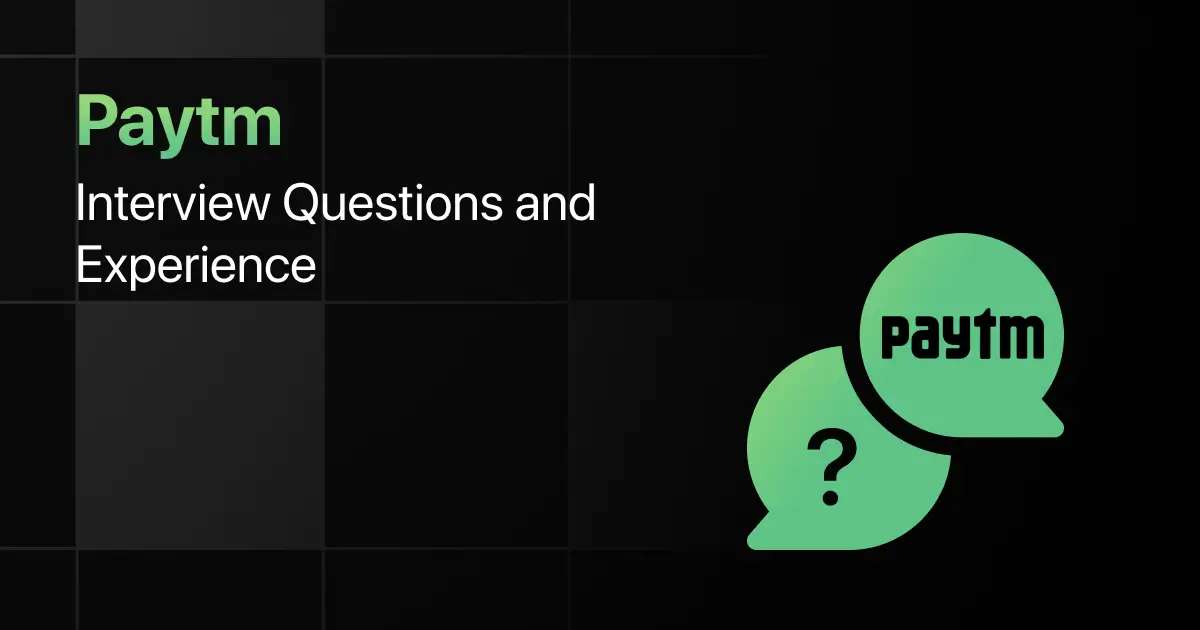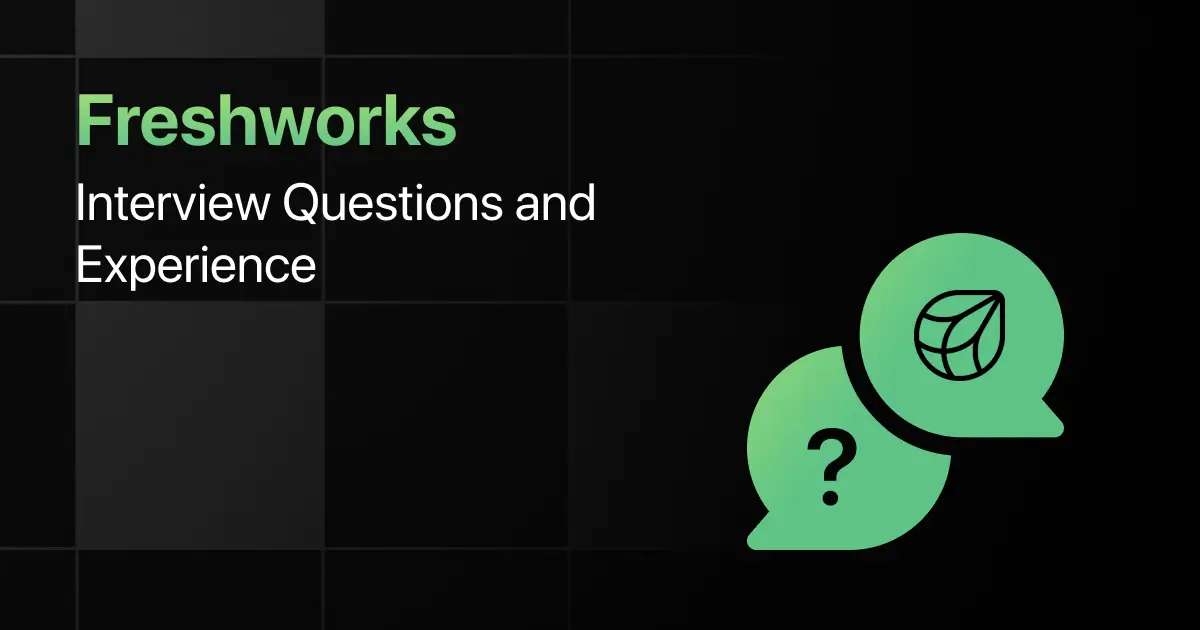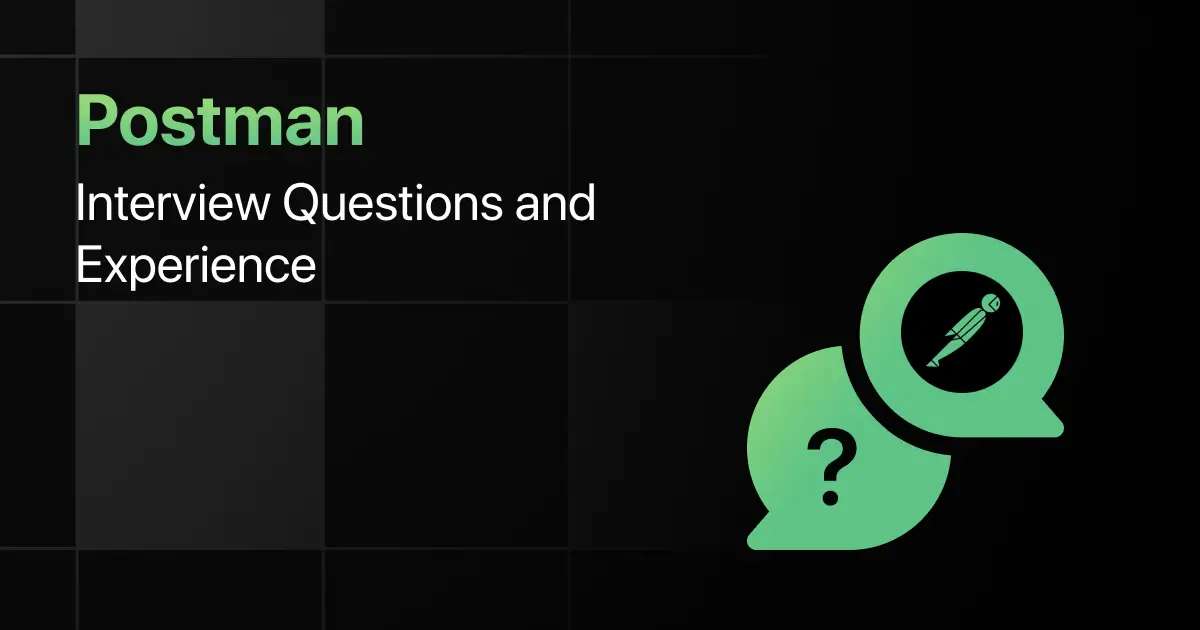IBM Interview Questions and Experience

Are you planning to interview with IBM? Many candidates find IBM’s process unique because it balances technical knowledge with problem-solving and communication skills.
The company looks for professionals who can adapt to diverse projects across consulting, software, and cloud services.
In this blog, we’ll explore IBM’s hiring process, common interview questions, and preparation tips to help you succeed.
IBM Hiring Process – Overview
Here’s a quick overview of IBM’s hiring process:
| Category | Details |
|---|---|
| Eligibility | Open to both freshers and experienced candidates. Preferred degrees include Computer Science, IT, Electronics, or related fields. |
| Rounds | 3–5 rounds: Online assessment (aptitude + coding), technical interviews, managerial round (for experienced), and HR interview. |
| Job Roles Offered | Software Engineer, Associate Systems Engineer, Data Analyst, Cloud Engineer, and Consulting roles. |
| Salary Range | Freshers: ₹4–6 LPA; Experienced: ₹8–25 LPA depending on role and experience (Glassdoor, AmbitionBox). |
| Apply Link | Apply Now |
Top IBM Interview Questions
IBM’s technical interview rounds emphasize problem-solving, programming fundamentals, and knowledge of databases, cloud, and emerging technologies. Here are some of the most asked technical questions.
1. Technical Questions
- What is the difference between primary key and foreign key in SQL?
A primary key uniquely identifies rows in a table, while a foreign key establishes a relationship between two tables. - Explain normalization in databases. Why is it important?
Normalization organizes data to reduce redundancy and improve consistency, often using normal forms like 1NF, 2NF, and 3NF. - How do you find the second largest element in an array?
By sorting the array or using a single-pass algorithm while maintaining two variables for max and second max. - What is the difference between compiler and interpreter?
A compiler translates the entire program into machine code before execution, while an interpreter translates line by line. - How would you implement a stack using queues?
Use two queues and perform push normally, while pop requires transferring elements between queues. - What is cloud computing, and how does IBM Cloud differ from AWS and Azure?
Cloud computing delivers services like storage, compute, and AI over the internet. IBM Cloud focuses on hybrid cloud and AI-driven solutions. - Explain polymorphism in Java with an example.
Polymorphism allows methods to perform different tasks depending on the object. Example: method overloading and overriding. - What are joins in SQL? Explain types.
Joins combine rows from multiple tables. Types include INNER JOIN, LEFT JOIN, RIGHT JOIN, and FULL JOIN. - How do you detect a cycle in a linked list?
By using Floyd’s cycle detection algorithm (slow and fast pointer approach). - What is Big Data, and how does IBM handle it?
Big Data refers to large, complex datasets. IBM uses platforms like IBM Watson and IBM BigInsights to process and analyze such data. - What are REST APIs, and why are they important?
REST APIs allow communication between systems using HTTP methods. They are widely used in scalable and distributed applications. - Write a SQL query to find employees earning above the average salary.
SELECT name, salary FROM Employees WHERE salary > (SELECT AVG(salary) FROM Employees); - What is the difference between overloading and overriding in Java?
Overloading allows multiple methods with the same name but different parameters. Overriding redefines a parent class method in a child class. - How do you handle exceptions in Java?
By using try-catch blocks, finally clauses, and custom exceptions to manage errors gracefully. - Explain the concept of microservices. How is it different from monolithic architecture?
Microservices divide applications into small, independent services. Unlike monolithic systems, they allow independent scaling and deployment.
2. Role-Based Questions
Fresher / Intern Roles
- What are the differences between Java and Python?
Java is statically typed and compiled, while Python is dynamically typed and interpreted. - Explain the concept of OOPS with examples.
Discuss encapsulation, inheritance, polymorphism, and abstraction with code snippets. - How do you approach solving aptitude-based coding questions?
Break the aptitude problem down into steps, write pseudocode, and optimize for time and space.
Software Developer Roles
- How would you design a scalable e-commerce system?
Explain database schema, caching, microservices, and API handling for large traffic. - What is the difference between multithreading and multiprocessing?
Multithreading shares resources within one process, while multiprocessing runs separate processes with independent memory. - How do you optimize SQL queries for performance?
Use indexes, avoid unnecessary joins, and analyze query execution plans. - What is IBM’s approach to hybrid cloud, and how would you use it in application deployment?
Discuss IBM Cloud Pak, containerization, and multi-cloud strategies.
Data / Business Analyst Roles
- How do you perform data cleaning in a dataset?
Handle missing values, remove duplicates, and normalize data formats. - What tools have you used for data visualization?
Examples include Tableau, Power BI, and IBM Cognos Analytics. - Explain a case study where you applied statistical methods to solve a business problem.
Provide an example using regression or hypothesis testing.
Project / Delivery Manager Roles
- How do you manage project timelines across global teams?
Use Agile or Scrum methodology, define milestones, and track progress using tools like JIRA. - How do you handle conflicts between stakeholders?
Facilitate open discussions, align with business goals, and build consensus. - What key performance indicators (KPIs) do you track in IT projects?
Examples include defect density, cycle time, uptime, and customer satisfaction.
Cloud / AI-Specific Roles
- What are containers, and how do you deploy them in IBM Cloud?
Containers package applications and dependencies. Deployment uses Kubernetes and OpenShift in IBM Cloud. - How do you use IBM Watson in real-world applications?
Examples include chatbots, sentiment analysis, and AI-powered business automation.
3. Behavioral Questions
- Tell me about a time when you had to quickly adapt to a new technology.
Explain how you learned the tool, applied it to your project, and ensured successful delivery. - How do you handle disagreements in a team setting?
Describe how you listened to different viewpoints, mediated the conflict, and focused on achieving team goals. - Give an example of when you worked on a project under tight deadlines.
Show how you prioritized tasks, communicated progress, and ensured quality delivery. - Describe a situation where you took initiative to solve a business problem.
Highlight how you identified the issue, proposed a solution, and delivered measurable results. - How do you ensure effective communication in a cross-functional team?
Mention regular updates, clear documentation, and active listening practices. - Tell me about a time when you had to lead without authority.
Explain how you influenced peers, guided decisions, and motivated others without formal leadership power. - How do you align your work with IBM’s core values of trust and innovation?
Share how you prioritize transparency, ethical practices, and creative problem-solving in your work. - Why do you want to work at IBM, and what value would you bring to the team?
Discuss your interest in IBM’s technology-driven culture and how your skills align with their goals.
IBM Interview Experiences
1. IBM Storage Intern Interview Experience (Fresher)
This interview experience is from Manasi Kamble, who interviewed for a Storage Intern role with IBM through campus recruitment. The process spanned three rounds over ten days.
Candidate Background
Fresher, Computer Science student with project experience in Operating Systems.
Interview Process They Faced
- Round 1 (Aptitude & Coding Test): MCQs from OOP, OS, DBMS, aptitude + 2 DSA coding questions (Binary Search, Graph Traversal).
- Round 2 (Technical Interview): 35–40 minutes; questions on projects, OS, exception handling in Java, SQL queries, and DSA problem-solving.
- Round 3 (PDM Interview): 30 minutes; questions on OS concepts, career goals, project implementation, and job role discussion.
Questions Asked
- CPU Scheduling types and their pros/cons.
- Exception handling in Java (try, catch, finally).
- DSA problem: Valid Anagram (LeetCode).
- SQL query basics.
- OS concepts: Paging, Virtual Memory, Segmentation.
Outcome & Difficulty Level
Cleared all rounds and was selected as IBM Storage Intern. Difficulty level: Moderate. Required strong fundamentals in OS, DBMS, OOP, and confidence during project discussions.
2. IBM Associate System Engineer Interview Experience (Experienced)
This interview experience is from Rugved Bongale, who interviewed for an Associate System Engineer role with IBM. The selection process included four stages, ranging from coding and aptitude assessments to interviews.
Candidate Background
Experienced candidate with skills in Java, Python, Node.js, and knowledge of Software Development Life Cycle concepts.
Interview Process They Faced
- Round 1 (Coding Test – IBM CodeKnack): One problem on hexadecimal input processing (grouping and reversing).
- Round 2 (Cognitive Ability – Cognify): Game-based test (Short Cuts, Resemble, Grid Lock, Tally Up, Numbubbles).
- Round 3 (English Language Test): 10-minute MCQ test on grammar, spelling, and word meaning with negative marking.
- Round 4 (Interview): Easy to moderate level; focused on projects, creativity in solutions, and HR questions.
Questions Asked
- Coding problem on hexadecimal number manipulation.
- Project-related discussions: implementation and creativity.
- HR questions: “Tell me about yourself,” “What makes your project unique?”
- General software development questions (moderate level).
Outcome & Difficulty Level
Cleared all rounds and selected as Associate System Engineer. Difficulty level: Easy to Moderate. Emphasis was on problem-solving, creativity in projects, and communication.
Preparation Tips for IBM Interviews
Preparing for IBM interviews requires a balance of technical skills, problem-solving, and strong communication. Here are some tips to guide your preparation.
- Revise Fundamentals: Focus on core areas like data structures, algorithms, SQL, and OOPS. IBM often tests conceptual clarity along with coding ability.
- Practice Coding: Solve coding problems on platforms like HackerRank and LeetCode. Pay attention to writing clean, optimized, and well-documented code.
- Understand IBM Cloud: Learn about hybrid cloud, containerization, and Watson AI services, as these are frequently discussed in technical rounds.
- Prepare Case Studies: Analyst and consulting roles may involve business scenarios. Practice explaining your approach using structured methods.
- Behavioral Readiness: Use the STAR method to answer questions about teamwork, leadership, and adaptability in past projects.
- Mock Interviews: Simulate interview conditions with peers or tools. This helps you practice explaining your thought process under time pressure.
Final Words
IBM interviews are structured to test both technical depth and professional behavior. Strong fundamentals in coding, databases, and cloud technologies, combined with clear communication and adaptability, can help you stand out.
With consistent practice and awareness of IBM’s values, you can approach the process confidently and improve your chances of success.
Explore More for
- Amazon
- Salesforce
- Oracle
- Microsoft
- Adobe
- Flipkart
- Apple
- Uber
- Meesho
- Zomato
- Swiggy
- Phonepe
- Zoho
- Postman
- Freshworks
- Paytm
- Darwinbox
FAQs
IBM interviews often include questions on data structures, SQL, OOPS, cloud computing, and behavioral problem-solving.
IBM interview questions for freshers can be challenging, but strong preparation in fundamentals and coding practice makes them manageable.
The IBM interview process usually takes 2–4 weeks, depending on the role and number of interview rounds.
Candidates should focus on Java, Python, SQL, cloud basics, and problem-solving with data structures and algorithms.
Common mistakes include weak coding explanations, ignoring edge cases, and under-preparing for behavioral and cloud-related questions.
The IBM interview process typically has 3–5 rounds, including online assessment, technical, and HR interviews.
Yes, freshers face more aptitude and coding-focused questions, while experienced candidates get design, cloud, and project management questions.
The best way to prepare is by practicing coding, revising concepts, and using resources on PlacementPreparation.io for guidance.
Related Posts


Paytm Interview Questions and Experience
Preparing for a Paytm interview requires a clear understanding of the company’s hiring process, the type of questions asked, and …
Warning: Undefined variable $post_id in /var/www/wordpress/wp-content/themes/placementpreparation/template-parts/popup-zenlite.php on line 1050








